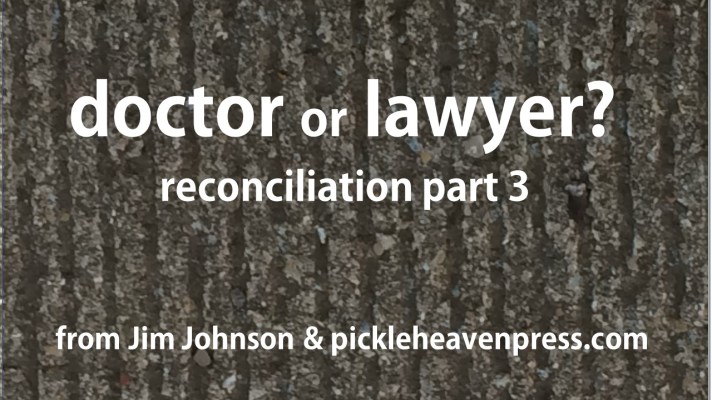You are probably either a doctor or a lawyer based on the way that you approach conflict.
May I illustrate? Suppose that I have a headache that just won’t quit, so I decide to seek some professional help.
I find the office building where the professionals ply their trade and find a name on a door: Doctor Ichabod Smith. I check in and finally get to see the doc. Turns out his doctorate is in Law.
Oh well! I tell him about the headache, and he asks me where I work and if I handled hazardous materials. Turns out I did! So, he declares that we are going to sue my employer for 5 million dollars for exposing me to asbestos.
Three years later we have our day in court and Ichabod does a stellar job of pinning the blame for my cancer on the Acme company. The judge decides in my favor and I am 5 million dollars richer.
But before I buy a Mercedes and a beach front cottage – I drop over dead.
Oops! Maybe I should have looked for someone with a doctorate in medicine instead. His questions would have been different: Where does it hurt? How long have you had this ache? He would have quickly identified my cancer and would have removed it asap.
Personal conflict is like a cancer. Some approach it like a lawyer whose essential job is to pin the blame for the problem on someone else. Their goal is to prove that their client is right even if they are wrong.
This person may win the argument but then find that the relationship dies as a result. If you want to see ugly, take a seat in divorce court and watch as the lawyers alternatingly devastate the wounded spouses. No one wins in divorce court.
Instead of looking for someone else to blame, we need to approach the conflict like a doctor. A doctor isn’t concerned about blame. The doc focuses on the problem. The enemy is not the other person but the source of conflict. That is what needs to be addressed.
I have a Master of Theology degree. I know the Bible well, but for the life of me, I don’t recall a Scripture which says, “When you have been wronged, make every effort to prove yourself to be right.”
On the other hand, there are lots of passages that tell us to pursue peace with each other. “Pursue peace with everyone…” (Hebrew 12:14); “Be at peace among yourselves.” (1 Thessalonians 5:13); “If possible, so far as it depends on you, live peaceably with all people.” (Romans 12:18); “And let the peace of Christ rule in your hearts.” (Colossians 3:15)
Over and over the Scripture calls us to seek peace in place of conflict.
Removing cancer isn’t painless or easy. There is the surgery and chemo and radiation. It involves temporary discomfort and pain, but in the end a life is often saved, or in this case – a relationship!
So, your wife criticized you for that last financial decision. Should you go to court, or sit down with her to find out what’s really bugging her?
Your boss got up on the wrong side of the bed. He isn’t happy with you or anyone else today. Is it time to get a subpoena or should you sincerely ask, “Hey how are things with you today?”
Your son forgot your birthday. Do you file a lawsuit or call him to say, “I was thinking about you and just wanted to say hi.”
Your husband was wrong in what he said. He knows it but will not admit it. How long will you argue your case until he agrees? Maybe you could win him without a word by giving him respect even when it is undeserved. (1 Peter 3:1-2)
Honestly: If you had cancer and had to choose between being right or being well, which would you choose? Exactly! Should you approach that rocky relationship in your life any differently?
A PRAYER: Lord, help me be aware of me, and the ways in which I relate to others.
This has been Jim Johnson with pickleheavenpress.com
May the grace of our Lord Jesus be with you.

